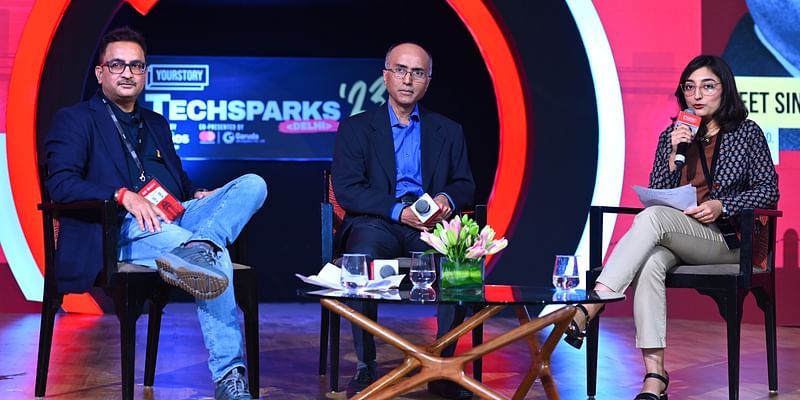
India is amongst the fastest growing fintech markets in the world. The market size, $50 billion in 2021, is poised to grow to $150 billion by 2025, according to Invest India, the national investment promotion and facilitation agency. The country also has the highest fintech adoption rate globally – 87% as compared to the global average rate of 64%.
Fintech is in the spotlight and TechSparks Delhi kept the conversation going with a discussion on the future of fintech in India and the need for financial inclusivity. The event featured industry leaders Vineet Singh, Co-founder and CEO of Castler, and Nabendu Das, Chief of Engineering at Tally Solutions, who shared profound insights into the evolution, challenges, and future prospects of fintech in India.
Reflecting on the success of UPI implementation in India, the host began by sharing a personal anecdote that illustrated how seamlessly digital payments have integrated into daily life. This anecdote, a powerful reminder of the positive impact of digital payments in India, was a great introduction to the discussion.
Vineet Singh highlighted India’s remarkable growth in online transactions and digital payments. He acknowledged the pivotal role played by banks in catalysing this growth through partnerships with fintech firms. Singh also commended the state-owned NPCI and major fintech players like Paytm, PhonePe, and Google Pay for their substantial contributions to the industry. He emphasised the importance of such partnerships in driving India’s digital economy forward and ensuring that the benefits of digital payments were accessible to all.
Nabendu Das reinforced Singh’s perspective by emphasising the availability of digital footprints and the ease of customer identification through online KYC. He underscored the transformative power of API banking, which has enabled fintechs to innovate for the masses. Das spoke about the significant shift in people’s willingness to go digital for financial services, marking a societal transformation.
Fintech has overcome many challenges in recent years, but many persist. Singh said payment fraud has increased 700% over the past five years, and emphasised the need for solutions like escrow banking. Castler uses escrow banking to facilitate deals, improve cash flow, and mitigate fraud risk.
Singh reiterated the importance of escrow banking in preventing fraud and resolving commercial disputes efficiently. He said escrow is the fastest way to bridge the trust deficit between transacting parties, and creates a scenario where trust is guaranteed, fraud is reduced, and business operations are streamlined.
Das also highlighted the role of TallyEdge in promoting financial inclusivity by streamlining the credit process. By gathering and organising financial information from multiple sources, TallyEdge enhances accessibility and affordability, ultimately benefiting individuals and businesses seeking financial services.
The collaboration between financial institutions and fintech startups also came up. Singh stressed the importance of trust-building in such partnerships and shared Castler’s journey of persuading banks to collaborate, He also spoke about the importance of adhering to regulations and operating responsibly.
Das added historical context, noting that banks have been pioneers in fostering innovation and collaboration with startups. He stressed on the importance of trust and shared insights into Tally Solutions’ journey, emphasising the need for startups to learn from the experiences of successful players in the industry.
Singh also highlighted the significance of establishing a strong operational foundation from the start, prioritising excellence of the business and its clientele. He advised against the trap of accepting every opportunity, and said fintech startups had to be responsible operators that heeded feedback.
Das spoke about the need for swift action and flexibility in the ever-changing market landscape. He placed great emphasis on the significance of launching products or ideas in the market as a means of validating them, acknowledging that even the most brilliant theories could require modifications based on practical input and feedback.
As the discussion concluded, an audience member raised a thought-provoking question regarding fintech’s expansion to unbanked regions. Das acknowledged the challenge but suggested using established channels, such as agents and physical correspondence to introduce financial services gradually. Singh pointed out that banking has a dual nature, encompassing digital and physical aspects, and emphasised the importance of waiting for financially stable fintech companies to build the necessary physical infrastructure for sustainable financial inclusion.
This discussion was a powerful testament to India’s growing fintech landscape, highlighting its remarkable achievements and the obstacles that lie ahead. The session emphasised the importance of a united and forward-thinking strategy to tackle the intricacies of the country’s financial ecosystem, ultimately leading to greater inclusivity and transformative change.



![Read more about the article [Funding alert] MediSage raises $7M in first round of institutional fundraise](https://blog.digitalsevaa.com/wp-content/uploads/2022/04/Imagefzlp-1625041985436-300x150.jpg)

![Read more about the article [Funding alert] Agritech startup Otipy raises $32M in Series B led by Westbridge Capital](https://blog.digitalsevaa.com/wp-content/uploads/2022/03/Imagec123-1646634356329-300x150.jpg)



![Read more about the article [Funding alert] SaaS startup Gumlet raises $1.6M led by Sequoia’s Surge](https://blog.digitalsevaa.com/wp-content/uploads/2021/07/Imagew3e9-1627364344797-300x150.jpg)

